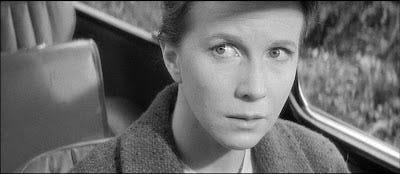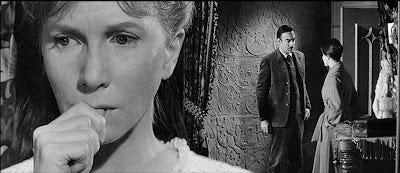The Pity of Saint Nell
I love The Haunting of Hill House, so this is me introspecting on the character of Eleanor Lance from 1963's adaptation, The Haunting.
I recently watched The Haunting (1963), a mostly faithful adaptation of Shirley Jackson’s novel, The Haunting of Hill House. As a fan of the novel and the tv show, it was neat to see another interpretation of the same material, and I was pleasantly surprised with how well the film details the novel’s character landscape alongside Hill House.
One thing I particularly enjoyed was seeing the characters as-written brought to life. Russ Tamblyn’s Luke is more gormless and less charming than written, Richard Johnson’s Dr John Markway is younger and more with-it than Shirley’s Dr John Montague. Theo is pretty spot-on. And Julie Harris’ Eleanor Lance is perfect, and illuminating.
In the novel we spend our time ensconsed in Eleanor’s mind and we see things her way. But when actors express the same dialogue out loud, they take on new voice and timbre. Funny lines can become so much funnier when said out loud as opposed to dead on the page. Some aspects of character emerge, and some recede.
What emerged for me was Eleanor, and her monstrous self-involvement and self-pity. She has, for understandable reasons, a chip on her shoulder as big as a house. She has spent her entire life under her mother’s thumb, and her adult years confined to the role of spinster nurse to the woman. And now that her mother has finally died, her reward for years of devotion and service is to live some kind of sidecar life to her sister and her sister’s husband, treated like a child or dependent. She may “share” ownership of the family car with her sister, but in practice she has no say in the matter.
Eleanor knows herself to be bright, sensitive, and poetic. She harbours a lifetime of resentment of her mother and her sister for their dominance of her life, and the loss of the potential that she feels within herself. This knowledge, of her beautiful, unappreciated, undeveloped mind and of its squandering, has curdled within her a child-like petulance, a self-pity that spills out of her unbidden with every interaction. She almost can’t seem to help herself as she tells the near-strangers at Hill House too much of her life at home, and how little she has waiting for her.
Eleanor’s need, to be loved, to be seen at all, is all-consuming and bottomless. She hums like an amp turned all the way up, just ready for any signal at all to resonate and feedback. Or perhaps it is the other way around; the house is a psychic resonator into which Dr Markway carelessly drops Eleanor’s raw source signal. Either way, the combination of the two triggers a feedback loop that escalates rapidly.
Eleanor’s monster is within her, grown ripe through years of nurture. She always wanted something to happen to her, and now it finally has. Lucky Nell.
Self-pity is an ugly way to be, no matter how justified and hard-done-by we are. For our own sakes, we must heal ourselves, love ourselves the way that we needed to be loved by others, say the things to ourselves that we wish had been said to us. We must keep an eye out on rumination and on the tendency to create narratives within ourselves that serve only to perpetuate our own pain.
It is the wounded sense of the self, allowed to canker, that justifies some of the enormous cruelty we lash upon others, deserving or not. It is understandable that we should put ourselves in the center of it all, and yet, to be an adult is to accept that we are not that - and should not be that - for anyone but ourselves.
Orson Welles’s summary of Woody Allan might well be a eulogy for Eleanor Lance:
”He is arrogant. Like all people with timid personalities, his arrogance is unlimited. Anybody who speaks quietly and shrivels up in company is unbelievably arrogant. He acts shy, but he’s not. He’s scared. He hates himself, and he loves himself, a very tense situation.”



